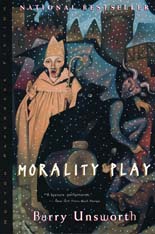
When director Betty Bernhard visited our class last, we began to ask her questions about the reality of our circumstances. We're a class of non-actors, though some of us have high school or college experience. We have only three weeks to rehearse, which sounds like a lot until you realize that's only one night a week. It became very clear that it would be a challenge just to pull off one show well, much less two.
The other thing that happened was that Betty threw out an offhand comment on wondering what it would be like to set the play within the modern context of Hurricane Katrina. There was some excited buzz as we talked about this during class and during breaks.
We had a chance in the latter part of class to run through the lines together for the first time. I was surprised by how difficult the rhymining lines were and how hard they seemed to follow what with God directing Noah to take along some binding slitch and all those specfic instructions about cubit measurements and how many clean and unclean animals to take along. If it's hard for us to follow after reading it a couple of times, I wonder how an audience will do.
We got an email from Melinda, our director, this week telling us that the production team has decided that we will do only one version of the play. It seems challenge enough simply to do one version well in the time we have. Since I was to play God in both productions, I wasn't affected as much, but I sympathized for the other actors who would have two parts to learn. For me, though, it means I need to rethink how I portray God. My plan was to show two very different natures of God. An more traditional "Old Testament" God for one and a more Process Theology God for the other. Now I need to find a way to blend both natures into one, but then, that's how I have to relate to my own concept of God. I have to reconcile that God of the Hebrew Bible with my post-modern sense of being led, nudged, sometimes cajoled by the sometimes-gentle, sometimes cajoling and invading nature of that which we call God into my life.

More troubling for me was the part of Melinda's email that said the production team had decided to set the play in New Orleans before during and after Hurricane Katrina. While I think there could be some profound ways to tell the Noah story as God's judgment on the abandonment of entire neighborhoods and people by governments who decided not to provide proper levees -- for that "sin" -- I don't think that's the way we would go. Also, it seems difficult to me to take a play that relies on humor to convey its message and layer that on top of the devastation of Katrina. And, I still have vivid memories of being in Louisiana on a work trip just three weeks after Katrina and listening to people who earnestly believed that the Hurricane was God's wrath coming down on the lifestyle of the city of New Orleans. They were quick to name not only the debauchery of Mardi Gras but also their sense that this was God's commentary on homosexuality. It was chilling to work side by side with these folks in the name of the same God and be called to that work for such different reasons. It would be very difficult for me to deliver some of God's lines if they were set in the context of judgement of New Orleans. Early on, God says: "I see my people in deed and thought are set foully in sin." And talks about "man, who through fleshly liking is my foe." The other thing that troubles me a little is that this was just decided. We didn't discuss as a class how to set the show. Now, in normal productions, the cast and crew would just be carrying out the producer and director's vision, but our charge in this class is to study medieval drama and then consider how to put one on.
These concerns, it turns out, were shared by others because we spent a good bit of the openig of this week's class in a full-on debate about the merits or not of setting the show in a Katrina context. Melinda's email made some good theological points, particularly that setting the play in the midst of the Katrina devastation "fits our motivational thrust: Why is Noah/Noah's Wife and family saved and not The Gossip and others? ... (and) it fits Beth Leehy's point of the Medievals wrestling with the plague and us wrestling with a Hurricane - uncontrollable major devestating events of which we have no control ... " We didn't resolve much in the discussion, which got a bit heated, but we do seem at least in consensus to move forward in a contemporary context.
We began blocking the play tonight. I had forgotten that this is how I used to learn lines in my high school and drama days. Theres's something about walking and talking that helps build a play into muscle memory. Though, three rehearsals won't be the same as three weeks of rehearsals.
Melinda's email had also asked the cast to consider the final sacrifice scene and come prepared to talk about what sacrifice his or her character would make to God.
We didn't get to this discussion tonight, and she hadn't asked me, but I kept finding myself wanting to speak for God and say what God wanted. I think God wants the people on the boat -- the people on the ark that is Earth -- to make whatever changes they need to make in their hearts and in their lives so that we truly know peace. That's what God wants.


